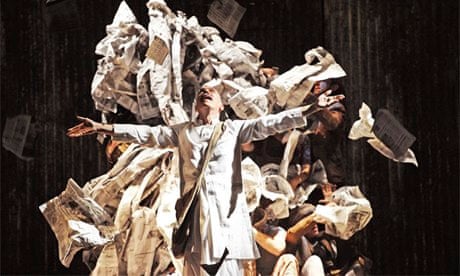Back at the Coliseum for its second revival since 2007, English National Opera's production of Philip Glass's opera about Gandhi's early non-violent campaigns against racism in South Africa, remains a really striking achievement on many levels, and an unmissable music theatre experience. If anything, its broad philosophical message is even more profound now than before, in the wake of today's unrighted injustices and often wilfully unlearned lessons of the financial crisis.
Satyagraha makes demands of its audience. Though not as long as the five-hour Einstein on the Beach, which Glass wrote four years earlier, it is fundamentally a reflective work. Although more operatic than Einstein, not much happens in its three acts, in a conventional narrative sense. There is no dialogue. The text, sung by the principals and the excellent chorus, is entirely in Sanskrit, adapted from the Bhagavad Gita. The music, famously so, is patterned and repetitive. The work has to be taken on its own terms.
The wonder is that all this succeeds so brilliantly and involvingly. It does so, above all, because the production by Phelim McDermott and Julian Crouch understands and has creative confidence in Glass's music and aims. The staging is full of visual patterns and flights of fancy of its own, which match and intertwine with those of the music. The attendant presences of Leo Tolstoy, Rabindranath Tagore and Martin Luther King emphasise the broader connections of the Gandhian story.
Stuart Stratford conducts with an unfolding certainty that allows one to appreciate the subtle colouristic differences in which Glass clothes the changing stage pictures. Some of the women principals had pitch problems on the first night, especially at the start of Act Three, but Clare Eggington invariably brings a strikingly effective lyric fervour to the role of Gandhi's secretary. At the still heart of things once more, as at every performance here since 2007, Alan Oke's Gandhi provides the serene yet searching tenor presence that makes this boldly improbable work so seriously engaging.

Comments (…)
Sign in or create your Guardian account to join the discussion